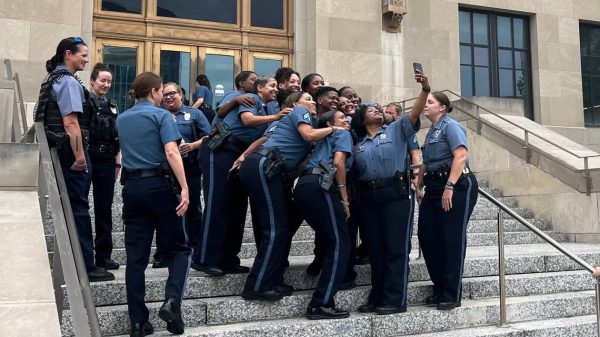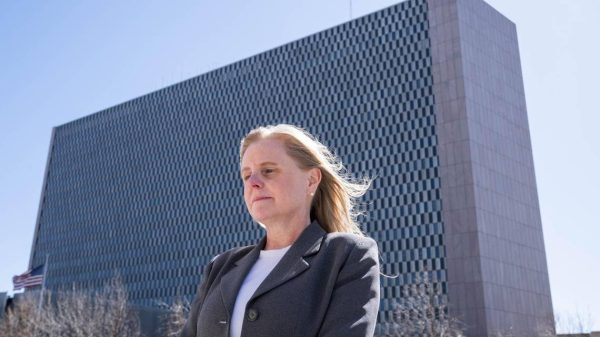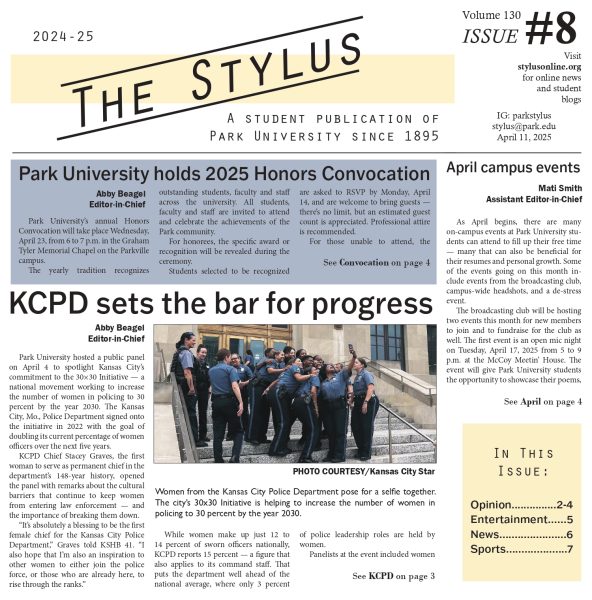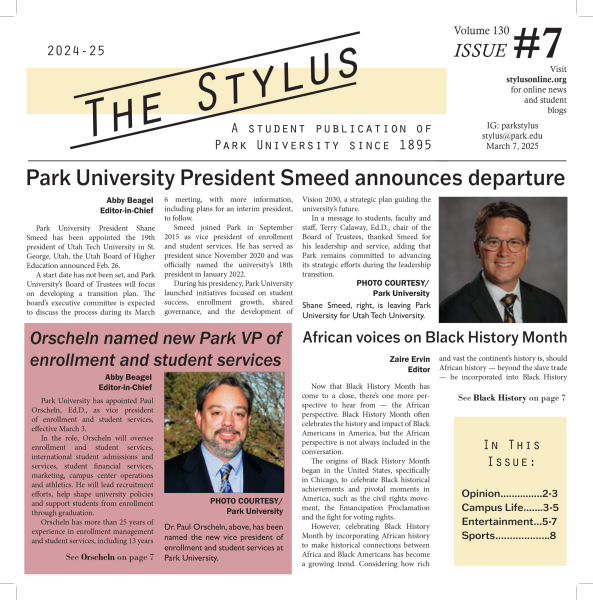Offical focus on sexual assault prevention
Park University – along with thousands of colleges across the nation – is responding to a national rise in allegations of sexual assault and poor reporting practices of incidents on college campuses.
The issue was thrust into the spotlight after a flurry of legal issues taking place at the state and federal levels.
The University of Missouri in Columbia, Mo., has been in the crosshairs of these allegations after a former football player was accused of rape and assault, both of which were allegedly known by coaches and other authority figures at the university, according to a report by the Columbia Daily Tribune.
“It’s really picked up steam in this last year because President Obama has taken it up as an issue and Missouri Senator Claire McCaskill and a couple of her colleagues have taken it up as their biggest issue right now across the nation,” said Courtney Goddard, Park University associate vice president and general counsel, during a panel discussion Sept. 19 regarding sexual assault and upcoming self-defense courses.
The panel discussion was sponsored by Tau Lambda Alpha Epsilon, Park’s chapter of the national criminal justice honor society.
Park University’s interim President David Fowler attended the panel and set the tone for the afternoon.
“I want to demonstrate how important this topic is and how important it is that we get it right,” said Fowler, “We want to protect our students. We want to educate all of our students about what this means and we also want to inform our students. I stand behind this education, this information and I stand behind enforcement to protect all of our students.”
During the discussion, Diana McElroy, dean of student life, explained some of the current measures in place on campus in light of new national allegations and concerns about sexual assault.
“Several of us have gone through additional training,” said McElroy. “We’ve developed other certifications to make sure we are doing the right thing and to do the job as well as we can to support and help individual students and also look out for students overall.”
According to Park’s annual Campus Safety and Fire Safety Report, which is required by the Clery Act for all colleges, only one case of stalking was reported during 2012 and no cases of sexual assault were reported. An updated report is required to be released by the university on Oct. 1.
However, a lack of reports does not make the campus safe from future incidents.
“We are not immune to that,” McElroy said during the panel in response to a student question about frequency of sexual offenses at Park.
Roger Dusing, Park University’s Title IX coordinator and director of human resources, said reports are sometimes difficult to flush out because there may be inconsistencies of stories by victims or other factors may be involved such as drugs and alcohol.
“It doesn’t make it right but it makes it hard to figure out,” said Dusing.
Title IX
Sexual assault is a subset of sex discrimination, which falls under Title IX.
Title IX is a portion of the United States Education Amendments of 1972.
Previously its been represented as a regulation applying mainly to athletics – men and women should be equal and have the same amount of funding and amount of sports sponsored by the school. In 2011, this changed.
The secretary of education wrote what is known as the “dear colleague letter”, which explained it’s not just about discrimination in sports. This transformed the meaning of Title IX to a broader definition. Currently Title IX prohibits gender discrimination in an education program or activity that receives federal funds.
“That changed the whole mix starting in 2011 about how colleges and universities looked at title IX,” said Dusing.
“And since then we have had the Violence Against Women Act, so we’ve had multiple acts from Congress that keep ratcheting it up.”
Each college or university follows a code of conduct. Park University provides their Student Conduct Code for all students, faculty and staff to access. You can find this code in your mypark or at park.edu/student-conduct-code/.
“If you go to the park page and you look for the student contact code or look at the student page on mypark there’s a whole list of all the things that students should do, shouldn’t do, and the repercussions of those,” said Dusing. “And it links in to the full Title IX policy.”
Park officials said they want to encourage students to report any violation they experience or witness. After a report, an investigation should promptly and transparently take place.
Park has four employees scattered throughout the campus who are trained in the investigation procedures.
“Regardless of the claim, we will do a full investigation and find out, if we can find out, what the truth is,” said Dusing. “The truth related to Title IX and these things is what is considered a preponderance of evidence. So in the legal world you have to prove that this really happened; in this world you only have to believe that it happened. So, from that preponderance of evidence then we will make a decision of what the appropriate disciplinary actions might be.”
For Park, punishment depends on the nature of the infraction and amount of evidence. Students can receive anything to expulsion and faculty or staff could be terminated.
“Our practices are consistent across the board,” said Karie Schaefer, director of residence life and education, during the panel Friday, Sept 19. “So, whether it comes up through residence life or a student coming in to inform another staff member, the practice is consistent.”
Theoretically, students can report a Title IX violation or sexual assault to anyone. However, Park has certain employees who are trained on the matter.
They are Dusing; McElroy; Jayme Uden, associate dean of students; Kenneth Christopher, deputy title IX coordinator and associate vice president for academic affairs; or Schaefer.
Campus Safety is not the primary investigative force, however, they may become involved if a case involves drugs or alcohol.
“We act as the liaison between every student, staff and faculty member here at Park between the university and the local police department and even the sheriff’s department,” said Christopher Loos, director of public safety.
Park also provides another way of reporting sexual crime. You can go to secure.jotformpro.com/parkconcernform/studentconductviolation for an online report form.
When filling out this form, students have the option to submit the report anonymously or provide their identity to the coordinators and authorities.
“If you don’t want to really talk to anybody but you’re okay typing it out, you can get to (the form) 24 hours a day,” said Dusing.
“But, obviously if someone says (they) want to be anonymous then it makes it a lot harder for us to investigate what might have happened. But yes, you have the option to just say ‘here is an event that happened that you need to know about’ or to say ‘here is what I witnessed.’”
“If you see something happen to someone else we would like to know about it,” said Dusing.
Self-Defense Training
In the aftermath of a recent addition to Title IX and sexual assault regulations, Park will soon conduct training courses to all students, faculty and staff. This course will be held online and range around 90 minutes in length.
Training will start within the next month, according to officials, and each course will be tailored to students, faculty or staff. Over 20,000 people will be required to participate in this one-time event.
Training will help clarify the big question: what is consent? It will help show what to look out for, how to help one another, what to do and what not to do.
“(Prevention) is by far the most important and effective part of this,” said Dusing. “We want to keep it from happening rather than define what we will do if it does happen.”
Park Title IX coordinators will also send out an email to the Park family with a link to the Student Conduct Code encouraging all to read and review.
Additionally, Friday, Oct. 3, Park’s Criminal Justice Club will host the first of three seminars in self-defense.
The progressive seminars are free and open to the Park community. Each session will be Friday from 3:30 p.m. to 4:30 p.m. in Labor Hall.
“The club was looking at things to do this year that would be relevant and one of the big topics this summer was sexual assault on college campuses,” said Greg Plumb, professor of criminal justice. “So that is what the officers of the club talked to us about and we thought it was a good idea and saw lots of benefits.”
The goal of the self-defense courses is to learn and then practice the skills needed to help defend yourself or others.
“The protection applies to not just sexual assault, this is for all assaults,” Plumb said.
Plumb added that sexual assault is still an important factor, especially since we are talking to college students. But the club breaks their seminars into three parts to include other probable situations. The seminars are: “safety on campus, in the dorm or at home”, “safety while driving, walking, or traveling” and “confidence and awareness”, which will include role-playing a variety of scenarios.
“Our mission is to educate students and this is all about how do we keep everybody safe while that’s going on,” said Dusing. “So it’s protecting your students but also protecting our staff, our visitors and our guests, all those people come together to make Park University and we want everybody to be able to have an experience here that benefits them.”
Your donation will support the student journalists of Park University. Your contribution will allow us to cover our annual website hosting costs, freeing up other funds for equipment, printing and training.






